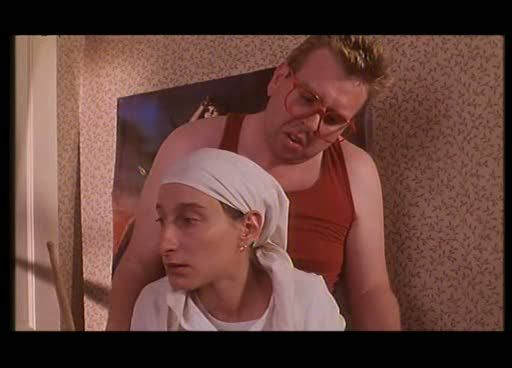
In a working class British neighborhood, a family struggles to survive and cling to their modest dreams despite the seemingly meager pleasures and opportunities available to them. They trudge through daily routines, fight and bicker relentlessly with one another, and make obviously ill-fated attempts at moving beyond their ruts. Any other director, titling this film Life Is Sweet, would be doing so as an ironic gesture, a self-aware commentary on the misery and abjection of these characters. For Mike Leigh, however, this title is obviously anything but ironic, and its resonances within the film are much more complex than a simple reversal of the film's bleak reality. Leigh's vision of life is often described as miserable or negative, which is not entirely incorrect, but is only an incomplete description at best. It's undeniable that he shows characters with problems and limitations not often seen in the cinema. His characters are stuck in dead-end jobs, they're crude and drunk and probably not particularly intelligent. Leigh doesn't sugar-coat things. He's presenting a vision of unvarnished reality, of the kinds of routine troubles that affect ordinary people: not enough money, bratty and ungrateful kids, business ventures that never go anywhere, a seemingly endless line of home improvement chores that there's never enough time or money to complete. These are true working class characters with working class problems, the kind of people who seldom appear on cinema screens. Leigh, and pretty much Leigh alone, is interested in telling stories about these people, and doing so without resorting to either glossy dramatization or "social problem" moralizing. Leigh's films are not political commentaries, at least not in the usual sense: he's not diagnosing an "issue" that needs to be addressed. He's just telling stories.
The story he has to tell here concerns the family of Andy (Jim Broadbent) and Wendy (Alison Steadman). He's an industrial chef working at a factory, while she works at a children's clothing store. They have twin daughters, Natalie (Claire Skinner) and Nicola (Jane Horrocks), who couldn't be more different. Natalie's a smart, together girl, a bit of a tomboy, working as a plumber and saving her money for a trip to America — her parents are perhaps a little concerned about her boyish mannerisms but they're proud of her ambition and essential goodness. Ah, and then there's Nicola. Nicola is an inspired creation, a mesmerizing trainwreck of a girl as conveyed through Horrocks' twitchy, snarling, utterly fearless performance. She's a bulimic, obsessed with her weight, a walking, scarecrow-like bundle of neuroses with a fuck-you attitude. Beneath her mop of brittle-straw hair and her enormous eyeglasses, her blue eyes are shifty and angry, and her mouth is perpetually twisted into one of a seemingly pre-programmed set of snarls and scowls and grimaces. She looks disgusted by the world, and by herself, horrified by everything she sees. She professes to a profound hatred of men, declaring herself a "feminist" without even really understanding what it means, and yet at the same time she seems drawn to men, a would-be Lolita whose twitching fingers betray her excitement when even the most unpromising male specimen walks in the door. She has a lover (David Thewlis in a pre-Naked trial run for his role as Johnny) who comes by during the day to smear her body in chocolate and have sex with her, though she inevitably throws him out in contempt immediately afterward, sickened by what they just did together.
Nicola is a fascinating character, a complicated mess of contradictions whose every line is brilliant — and often brilliantly comic, too, although it's undeniably a dark and somewhat uncomfortable strain of humor. She works best in the many closeups Leigh gives her, closeups of a probing and intimate quality that capture every nuance of her frustration and rage and blistering emotional onslaughts. Leigh is famous for the care and attention he gives to his actors, developing their characters with them over the course of lengthy rehearsals before a frame of film is even shot. This process shows through in the depth and complexity of these characters. Each character is lived-in, perfectly conceived.
One hesitates to call it realism, since these performances often shade into the realm of cartoonish exaggeration, but it's maybe a kind of realism, since, even if the individual characters are outlandish, they fit together as a family. They feel right together. Steadman's loony, chirping housewife is a good fit for Broadbent's slightly goofy middle-aged working man, who gets excited like a kid at the prospect of opening his own lunch wagon and going out on his own at last. Wendy and Andy fight, and one can often see the traces of bitterness passing beneath their banter — the angst about their puffy middle-aged bodies and "love handles," the struggle of living in a lousy apartment that continually needs work — but there's also tenderness between them. Leigh films an extended scene of them lying in bed, cuddling, Andy playfully goosing his wife beneath the covers as they worry together about their kids and talk about their plans for the future. It's a sweet scene, a gentle, loving moment that puts their relationship in context.

This is perhaps the point of the film's title. For this family, life is sweet not because of material circumstances (certainly not!) but because they still have hopes, they still have ambitions, they have affection and respect for one another. Only Nicola seems to have no hopes, no positive feelings whatsoever. Only Nicola, seeing how little they have and how little real chance there is of getting any more, has given up, retreating into herself behind a door marked "private." She poses at politics, but as her mom points out late in the film, she never actually does anything about it. In a display of open-mindedness, Wendy tells her that if she's actually "political," to go join a socialist group or something, to go protest something. Actually, Nicola isn't political, she's just a snotty punk, and her sneering attitude is a disguise, a mask for her emptiness and confusion. Leigh allows her to develop naturally towards the moment when the mask falls away, when the traces of the little girl within begin to show through.
But what's interesting is that Nicola's opening up, her moment of vulnerability, is treated not as a breakdown but as a breakthrough. The film's structure is built on a familiar model, the escalating series of events that culminate to break up the family's routine, seemingly leading towards a tragic denouement. This trope is well-worn, the kind of film where in the final act everything starts to go wrong for the characters, their routine shattered and their lives upended — think of P.T. Anderson's Magnolia and the countless films it drew the template from. In the final act of Leigh's film, Andy falls at work and breaks his ankle, Wendy is sexually assaulted by a drunken family friend (Timothy Spall), and Nicola's boyfriend breaks up with her before her mother begins berating her. And yet there's no tragedy. The moment the audience is expecting, the moment when it all comes crashing down in tears and misery, never comes. Andy, though in obvious pain and frustrated by the setback, treats his injury with shamefaced humor, hanging the spoon that tripped him on the wall in a "place of honor." Wendy shrugs off their friend's attempted rape and the loss of her waitressing job, vowing to focus on her family. And Nicola's rough day seems to be a promising first step towards an uneasy rapprochement with the world and, most importantly, with her family.
The film's final shot is an image of the two sisters sitting on the back porch together, talking honestly about their problems, with Natalie promising to help her sister. It's not a feel-good ending, exactly, but it suggests hope, it suggests that things are not quite so bad as they sometimes appear, that this family will continue to muddle through and find moments of happiness here and there. This is what Leigh is after, this kind of honesty that doesn't descend to maudlin melodramatics or tear-jerking manipulation. He's honest about the ugliness and deprivations of this family's life, the con schemes and decrepit home and drunkenness and squabbles, but he's also honest about the good things. The film is full of humor, and yet Leigh isn't laughing at these characters; he's finding humor and pleasure in their lives because that's what they do. Even the misanthrope Nicola provides a kind of humor for her family, who almost enjoy her nihilistic pronouncements in a certain perverse way. Ultimately, the point is that attitude matters far more than concrete circumstances. Leigh's characters could easily give in to squalor and abjection, could easily say "fuck off" as Nicola does, but they don't. Instead, they struggle on, make do, live for their hopes and for each other, for the rare but nonetheless cherished moments when they can say, with genuine contentment, that life is sweet.

4 comments:
"It's not a feel-good ending, exactly, but it suggests hope, it suggests that things are not quite so bad as they sometimes appear, that this family will continue to muddle through and find moments of happiness here and there."
I have (endlessly) promoted this film since it's release almost two decades ago, and even preferred it to the later SECRETS AND LIES as Leigh's finest work. I stood by this until VERA DRAKE, but in ways LIFE IS SWEET is more emblamatic of Leigh's fabric, with a deft merging of humor and domestic problems. (which are most pronounced here)
Mike Leigh's 'realism' may be cartoonish as you say, but it's realism nonetheless, and it's what further authenticates all his work in a sense.
Both Jane Horrocks (especially) and Alison Steadman give performances that rank among the best ever turned in for Leigh, but this is surely the director's triumph.
Yet another wonderful review.
Leigh's vision of life is often described as miserable or negative, which is not entirely incorrect, but is only an incomplete description at best.Exactly. It's often troubled that some people chalk Mike Leigh up as a director who wallows in the troubles of the lower-to-middle classes. So wrong. He never wallows, he gives us sparky human experiences that can feel desperate, but usually (for me) come out on the hopeful side. Even something like Bleak Moments in its, er, bleakness, feels so glowingly pretty to me.
As it was touched on briefly at Greg's today, I've also read some people cast Leigh as cynical or nihilistic (I think this came mostly after Naked, which, to me, isn't a nihilistic film at all... but that's for another time...), but I think that is way off. A cynic or a nihilist wouldn't care to unwrap such eccentric and delicate details in their characters. Whenever I hear a friend dismiss Leigh as a cynic, I tell them to watch Career Girls.
Great review, Ed.
Sam, I'm glad to hear you enjoy this one too. It hasn't quite unseated Naked as my favorite Leigh, but it's definitely a great one.
Fox, I'm with you completely on Leigh, who I think is very badly misunderstood. Naked is brilliant, and not at all nihilistic -- maybe Johnny is a nihilist, and he's definitely a cynic, but the film certainly doesn't take the point of view that Johnny is an admirable role model. The thing about Leigh is that even when his characters seem completely trapped and everything is hopeless he still shows such love and care for them that it's impossible to call him a cynic. He's one of the modern cinema's great (and few?) humanists.
I've not seen the film but its producer, and Leigh's regular producer for some 20 years, Simon Channing Williams passed away at the weekend.
Post a Comment